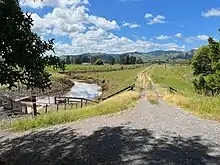Paeroa–Pokeno Line
The Paeroa-Pokeno railway line or deviation in the upper North Island of New Zealand between Paeroa on the East Coast Main Trunk (ECMT) and Pokeno on the North Island Main Trunk (NIMT) was a proposed route with construction started but abandoned. The proposal has been revived in recent years as part of a more direct route between Auckland and Tauranga.[1]
History

A request for the line was made in 1905[2] and a route surveyed in 1926.[3] Proposals were also made to shorten the route by a further 12 mi (19 km), by starting it at Manurewa and serving Hunua.[4] Work started in 1938 on the 42 mi 69 ch (69.0 km) line, which would have shortened the distance from Auckland to towns on the ECMT by 45 mi 69 ch (73.8 km). Minister of Public Works, Bob Semple, turned the first sod on 27 January 1938 at Paeroa[5] and about 32 mi (51 km) of the 42 mi (68 km) line had been started[6] when work was abandoned in 1940.[7] Work was still making slow progress in 1950, when a paragraph in the Ministry of Works annual report said 20 private crossings had been formed and metaled and 456 ft (139 m) of culverts installed.[8] Most of the work was still in place in the 1960s,[9] though very little is now visible.[10]
The Kaimai Tunnel relegated this section to ghost status; in August 1962 a deviation from Wahora to Apata passing under the Kaimai Range in a long 8.85 km (5.50 mi) tunnel was approved.[10] Work on the tunnel did not commence until 1969. With the opening of the tunnel in 1978, the Paeroa – Katikati section of the East Coast Main Trunk was closed. The line to Paeroa was then part of the Thames Branch, which closed north of Waitoa in 1991.
Originally the line was to be the first part of the East Coast Main Trunk Railway crossing the Bay of Plenty to Opotiki and then inland to Gisborne via the Moutohora Branch.
Revival
During the 2014 New Zealand general election the New Zealand First political party included a proposal to build a Pokeno-Paeroa-Te Aroha-Kaimai tunnel railway line as part of its "Railways of National Significance" transport policy.[1] The policy consists of completing the Pokeno-Paeroa line, re-using part of the now-closed Thames Branch between Paeroa and Te Aroha and a new link between Te Aroha and the western portal of the Kaimai tunnel, altogether creating a more direct link along a faster route, providing more capacity on the very busy rail freight corridor between Auckland and Tauranga, together with linking the towns of Maramarua, Ngatea, Paeroa and Te Aroha as potential future satellite suburbs of Auckland on a new commuter rail service route between Auckland and Tauranga.[1]
References
Citations
- "Answers to Questions for the New Zealand Transport Worker" (PDF). Rail & Maritime Transport Union. 2014. Retrieved 20 January 2020.
- "Parliamentary Jottings. Thames Star". paperspast.natlib.govt.nz. 11 July 1905. Retrieved 10 March 2023.
- "LOCAL AND GENERAL. Thames Star". paperspast.natlib.govt.nz. 8 March 1926. Retrieved 11 March 2023.
- "The Proposed Paeroa Manurewa Railway. Ohinemuri Gazette". paperspast.natlib.govt.nz. 21 April 1920. Retrieved 11 March 2023.
- "NEW RAIL LINK Waikato Times". paperspast.natlib.govt.nz. 28 January 1938. Retrieved 10 March 2023.
- "RAIL LINK TO PAEROA Press". paperspast.natlib.govt.nz. 24 June 1960. Retrieved 10 March 2023.
- "LOWER EXPENDITURE Waikato Times". paperspast.natlib.govt.nz. 28 June 1940. Retrieved 10 March 2023.
- "AtoJs Online — Appendix to the Journals of the House of Representatives — 1950 Session I — D-01 MINISTRY OF WORKS STATEMENT (BY THE HON. W. S. GOOSMAN, MINISTER OF WORKS)". atojs.natlib.govt.nz. Retrieved 18 May 2016.
- "1:63360 map Sheet: N53-54 Paeroa". www.mapspast.org.nz. 1965. Retrieved 10 March 2023.
- Leitch & Scott 1995, p. 16.
Bibliography
- Leitch, David; Scott, Brian (1995). Exploring New Zealand's Ghost Railways. Wellington. ISBN 1-86934-048-5.
{{cite book}}: CS1 maint: location missing publisher (link)
External links
- "Pokeno to Paeroa Railway". Mangatangi Historical Group.
- "1938 map of proposed line". New Zealand Herald. 25 January 1938.
- "1938, Bob Semple to turn first sod". Auckland Star. 27 January 1938.
- "1938, photo of Bob Semple". New Zealand Herald. 28 January 1938.
- "1938, presentation to Bob Semple". New Zealand Herald. 28 January 1938.
- 1938 photo of river dredge and gravel pipeline to the railway
- 1942 one inch map showing where the railway was under construction